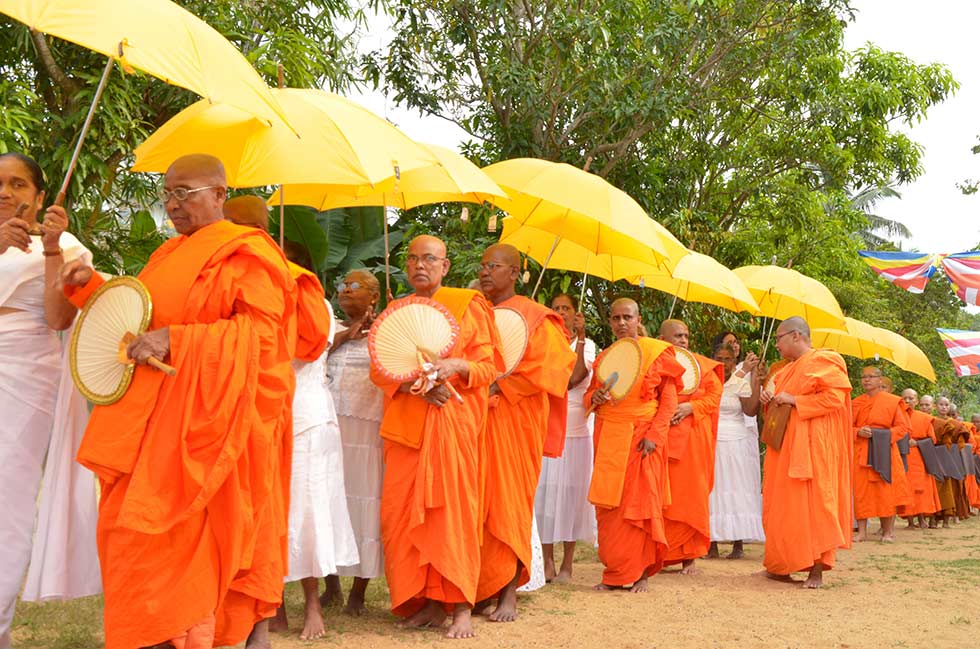Colombo, Supreme Court recognises religious title for Buddhist nuns
The word ‘Bhikkuni’ will appear on identity cards, allowing female religious figures in Sri Lanka to enjoy a range of civil rights. According to the Supreme Court, refusing to use the title in documents violated constitutional rights. This is the first time that the formal existence of the female community ordained in the Buddhist Sangha, which numbers thousands of women in Sri Lanka, has been recognised.
Colombo (AsiaNews) - The Supreme Court of Sri Lanka has taken a historic decision, officially recognising the right of Buddhist nuns to be identified on their national identity cards as ‘Bhikkhuni’, i.e. fully ordained religious women.
The ruling, issued on 16 June, has been hailed as a ‘milestone’ for religious and gender rights, marking a profound change in the legal and cultural recognition of the female Sangha within Theravada Buddhism.
The case was brought in 2013 by Venerable Welimada Dhammadinna Bhikkhuni, with the support of Venerable Inamaluwe Sri Sumangala Thero, mahanayaka (spiritual leader) of the Rangiri Dambulla Chapter, who had already promoted women's ordination in Sri Lanka in 1998. For over a decade, Dhammadinna had been denied the opportunity to register as a “Bhikkhuni”, having to settle for the title “Sil Matha”, used for lay devotees and not for nuns.
According to the Court, this refusal violates Articles 12 and 14 of the Constitution, which guarantee equality before the law and freedom to practise one's religion individually or in community. Judge E.A.G.R. Amarasekara, with the consent of the President of the Court, Murdu N.B. Fernando, ordered the State to bear the legal costs and the Department of Registration to immediately issue correct identity cards to all Bhikkhunis.
The issue was not merely bureaucratic, but had practical implications: without a document stating their correct religious status, thousands of nuns – around 8,000 in Sri Lanka today – were unable to vote, obtain a passport or access higher education. Today, around 3,000 Bhikkhunis live in 237 monasteries across the country, following the monastic rules of the Vinaya, the Buddhist “discipline” that applies to monks and nuns.
The controversy also arose from a conflict with the male religious authorities. Some ahanayaka of the dominant male brotherhoods had in fact expressed their opposition to the issuance of documents to nuns, stating that the Sangha of Bhikkhuni, i.e. the female sangha (community), no longer existed, and further argued that its recognition would violate both the vinaya and Article 9 of the Constitution, which requires the State to ‘protect and promote the Buddha Sasana,’ scholars Dharmasri Kulendra, Pramodhi Sirimanne and Sashikala Tennakoon explained to AsiaNews
.However, for the Venerable Inamaluwe Sri Sumangala Thero, the ordinations initiated in 1998 are valid and legitimate. Over the years, the Bhikkhunis have already received official documents such as passports and academic results. Only the identity card was missing.
"Although the ruling specifically concerns the national identity card in Sri Lanka, this decision provides a legal and institutional basis for policy reform in all public institutions, from education to counselling and temple governance. The ruling is a legal milestone and a moral turning point. The petition translates into official recognition, not only for Venerable Dhammadinna but for thousands of Buddhist nuns around the world," the academics emphasised.
12/02/2016 15:14







.png)










